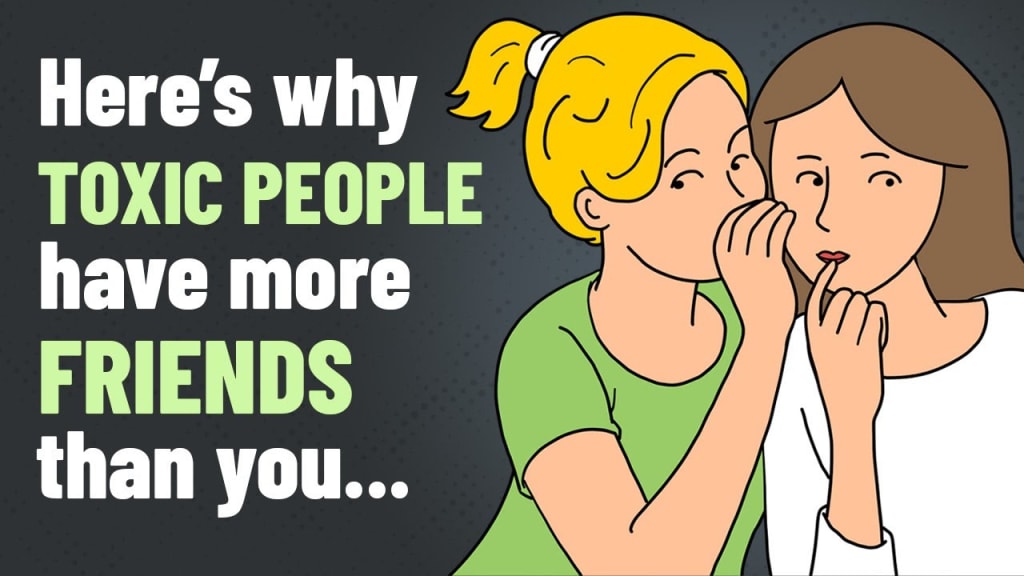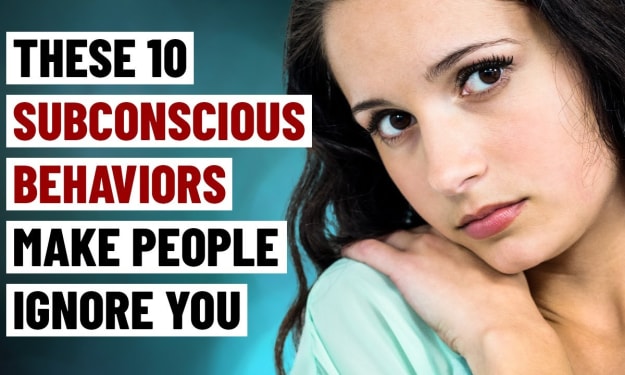6 Reasons Why Toxic People Have More Friends Than You
Social interaction is a critical aspect of human life, and most of us aspire to have friendships and social circles we can rely on. But do you ever find yourself wondering why toxic people seem to have an abundance of friends, while you feel like you’re lacking in this department? It’s a perplexing phenomenon that we often lose ourselves in, wondering why popularity seems to be so skewed in favor of those who bring so much negativity and drama into people’s lives

6 Reasons Why Toxic People Have More Friends Than You
Social interaction is a critical aspect of human life, and most of us aspire to have friendships and social circles we can rely on. But do you ever find yourself wondering why toxic people seem to have an abundance of friends, while you feel like you’re lacking in this department? It’s a perplexing phenomenon that we often lose ourselves in, wondering why popularity seems to be so skewed in favor of those who bring so much negativity and drama into people’s lives. But the truth is, popularity doesn’t always equate to genuine connections. In this video, we explore the concept of the “illusion of popularity” and the psychology behind toxic people’s behavior. By understanding why and how they attract social circles, you can protect yourself and cultivate healthier friendships. So, let’s take a closer look at what’s really going on behind the façade!
Number 1 - Social Camouflage and Superficial Connections Toxic individuals are often skilled at seamlessly blending into different social groups - and presenting themselves in a way that attracts others. They may have well-developed social skills, charisma, or the ability to adapt their behavior to fit into various situations. This social camouflage allows them to create the impression of having a wide network of friends. They engage in surface-level interactions focusing on small talk, flattery, or engaging in activities that require little emotional investment. These relationships often lack genuine connection, as toxic individuals prioritize their own agenda and interests over developing authentic relationships. The apparent popularity they possess is a smokescreen, concealing the absence of deep and meaningful bonds.
Number 2 - Power Dynamics and Influence Toxic people often possess a certain level of power or influence that attracts those eager to benefit from the association. This power could stem from various sources such as social status, wealth, or professional connections. People may be willing to overlook the toxic behavior of these individuals because they believe that being friends with them can bring personal gain, whether it’s access to exclusive social circles, career opportunities, or validation from being associated with someone influential. This creates the illusion of popularity, as others perceive the toxic person as someone who has more friends than they actually do.
Number 3 - Manipulation Tactics and Fear of Confrontation Another reason toxic people amass friends is their ability to manipulate others to maintain their relationships. They use a range of tactics, including guilt-tripping, emotional blackmail, gaslighting, or excessive flattery to keep others engaged while avoiding accountability for their toxic behavior. People often fear confronting such individuals about their actions due to potential negative repercussions, such as retaliation, ostracization, or damaging their own reputation. This fear creates the illusion of unwavering friendship as they continue associating with toxic people despite the harm caused. Essentially, the toxic person’s manipulation tactics can coerce others into remaining in their orbit, giving the impression of popularity and loyalty.
Number 4 - Reinforcement from Like-minded Individuals Toxic people often surround themselves with others who mirror their toxic traits. This group dynamic can create the illusion of having more friends, even though these individuals only serve as a reinforcement system for the toxic person’s harmful actions. They validate, encourage, or participate in toxic behaviors. And while the toxic person may derive temporary validation, these connections are unhealthy and unsustainable in the long run. They lack the depth, emotional support, and authenticity that true friendship brings.
Number 5 - Lack of Discernment Not everyone possesses the ability to identify toxic traits in others. This lack of discernment and awareness further plays into the illusion of popular friendships, as people unknowingly align themselves with toxic individuals without realizing the negative impact on their well-being. Some are just overly trusting, always giving others the benefit of the doubt. They fail to recognize the red flags and don’t understand the consequences of toxic behavior. Consequently, they form relationships with such individuals without fully understanding the potential harm they expose themselves to. They may believe these folks to be harmless or completely misinterpret their behavior.
Number 6 - Social Media Projection and the Blurring of Reality In today’s digital age, social media platforms play a significant role in shaping our perception of others. Toxic individuals take advantage of this by carefully curating their online presence to project a vibrant social life filled with numerous friends and exciting experiences. With carefully selected posts, filtered images, and engaging captions, they create an image of popularity and happiness. They showcase social gatherings, travel adventures, or a glamorous lifestyle.
However, behind the meticulously crafted front of a thriving social life lies the truth of superficial relationships and a lack of genuine friendships. The toxic person’s online popularity relies on the illusion they create, blurring the line between reality and digital projection. At the end of the day, toxic people may seem to have many friends, but their relationships are often built on a shaky foundation of manipulation and control. The illusion of popularity they create masks the toxic dynamics at play.
True popularity lies in being authentic, kind-hearted, and compassionate. So, focus on creating a positive environment for yourself and nurturing friendships that bring joy, support, and growth to your life. By prioritizing your own well-being and surrounding yourself with genuine and loving individuals, you will find true fulfillment in your relationships. Let go of the illusion of popularity and embrace the beauty of authentic connections!






Comments
There are no comments for this story
Be the first to respond and start the conversation.